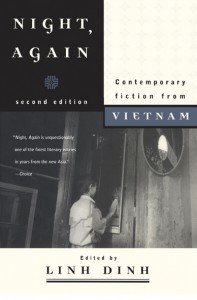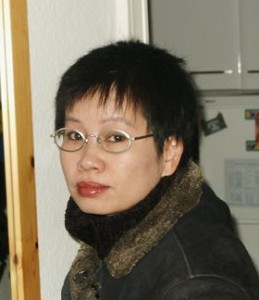–by Nichole Reber
Ask for names like Basharat Peer or Tashi Dawa at your local or chain bookstore and the clerks look at you like you’ve got seven heads. I was the one confused, though, by the lack of easy access to international authors upon repatriating back to the States. Sure, I no longer had daily access to ramshackle book vendors beside Mumbai train stations, Peruvian favorites in Lima’s bookstores, or expat bar bookshelves in China, but need that put an end to my colorful reading? So join me in this journey between crisp white pages of new literary titles and soft yellowed pages of older books.
“Heartbreaker on a Quest”
Writer Pham Thi Hoai knows how to tick off the Vietnamese powers that be. Her homeland’s government accuses her of disregarding social taboos, disrespecting traditions, having a pessimistic view of their country, and worse— abusing the “sacred mission of a writer.”
In the book that introduced me to her work, Night, Again: Contemporary Fiction from Vietnam, edited by Linh Dinh and published by Seven Stories in 1996, Dinh describes that “sacred mission.” Writers throughout East Asian history were considered public servants, he explains. Their task “was to steer the masses toward righteousness. Writing that is irreverent, playful or morally ambivalent,” he writes, “was seen by the ruling class as either frivolous or subversive.” By 1978, Dinh writes, more than 160 South Vietnamese writers were detained in re-education camps (which my experience living in China taught me to interpret as brainwashing camps, a newfangled Cultural Revolution practice). About a decade later Vietnam’s political climate appeared to have changed. Secretary General Nguyen Van Linh encouraged writers to “’Speak the truth… No matter what happens, Comrades, don’t curb your pen.’” That was, however, not entirely true.
Hoai is just one author whose work, such as her first novel The Crystal Messenger, was banned. She now lives in Berlin where she founded and writes in an apparently incendiary online journal in Vietnamese, which has also been banned in Vietnam. Her work, fortunately for us on this side of the planet, has been translated into English, French, Spanish, Italian, German, and Finnish.
Dinh brings us one of her short stories, “Nine Down Makes Ten,” in Night, Again. It flows elegantly and easily, whisking the reader along through what initially seems a straightup chronological life story about the men the protagonist has tried on and shed along the path of life. It has universal appeal because our own romantic stories let us relate to character studies one through nine. But slowing down into the bittersweet piece, we see beneath the surface a spiritual quest.
We meet the first man, whose life has been untouched by self-doubt.
“By his side I could perhaps have lived the most suitable kind of life… I’d give birth to well-fathered children and sit nightly, clutching a ball of colorful wool, knitting colorful clothes, oblivious to self-doubt. Moreover, I would never fear unfaithfulness from him, as he could barely conceptualize adultery.”
Then she changes her mind. Why? Why change your mind when this seems like the kind of man our mothers and friends and our very own fears would have us marry? Because sometimes it’s actually the best qualities of lovers that send us running. In her case, the protagonist wondered, “Lacking skepticism how could he understand science, art, religion, and, in short, how could he understand love?”
The second man is frivolous and merry, but he teaches the protagonist that, though she experienced with him some of her happiest hours ever, it wasn’t actually merriment and frivolity he exhibited. It was blissful ignorance of an unexamined life. The third man bears the kind of beauty that’s often the ruin of everything. Beneath those lovely looks is nothing more than an inarticulate dullard. The experience turns her to the opposite, an older, worldly man.
“I lived with him the longest, more than two years, and I grew much during this period. He knew how to answer all of my questions about politics, love, religion or the psychological taboos of bygone eras.”
We all know a man like this, hopefully have experienced a man like this. But still, we search on. Perhaps we come across a character like the fifth man. An idealist. But when the protagonist challenges that idealism, puts it to an endurance test, the man suffers a severe spiritual crisis that lands him in the hospital. Man number six brings to mind Sheldon from The Big Bang Theory. Of all his complex thinking and compulsion toward originality, she asks, “Do all these interesting and complicated things really exist, or are they only an expensive and ultimately meaningless drama that people feel compelled to stage in order to cope with their fellow men and themselves?”
She leaves him behind and finds another, who psychologists might call a sociopath. This man cuts her away from her own world, essentially makes her an extension of himself— and obsesses on the ontological difference between quotidian things such as potatoes and ants. This is a striking part of the story in which Hoai lets the spiritual undertones speak louder.
“The demands of individual liberation eventually transform society into a mass of ‘I’s, each one desiring to control the others,” and so, when the lover turns his obsessions heaven-ward, it’s the protagonist’s time to move on.
“I returned to my original form as a potato or maybe an ant, and heaved a sigh of relief. I felt sorry for God or Buddha, as this poet would certainly grate on them. But perhaps those two gentlemen understand the essence of life better than I.”
Finally, in the ninth man she meets her match. Marriage becomes a word worth contemplating.
“He… was so helpful with my unhappy life’s most pressing problems (more so than all the other men combined), that during those moments of satisfaction and gratitude I confusedly asked myself if this really could be love.”
She reconciles that perhaps it’s OK this man hasn’t yet experienced his spiritual crisis. He’s good to others. He allows her her personal freedom, and she, for the first time in her life, finds contentment and new meaning in life. She accepts that he won’t fulfill every one of her needs. And then, with a single sentence, the plot culminates with a twist, and the mood turns to something that took this reader’s breath away.
In Hoai’s story, we recognize our own recollections of lovers. We understand the protagonist because we too line up the relationships that lead to where we are. But she comes to an understanding that I would argue too few of us Western women or men understand: we cannot expect one person to satisfy all of our needs. There is no one person who can enrich every element in our lives. And so, in our part of the world where we marry not for pragmatism but for love, where we fantasize we can find a loving and understanding spouse who will remain with us for the rest of our lives (and divorce and remarry in the constant effort to find such a ShangriLa), where we allow life’s bumps to render our marriage asunder sooner rather than later, the protagonist’s discovery is something worth savoring.
the relationships that lead to where we are. But she comes to an understanding that I would argue too few of us Western women or men understand: we cannot expect one person to satisfy all of our needs. There is no one person who can enrich every element in our lives. And so, in our part of the world where we marry not for pragmatism but for love, where we fantasize we can find a loving and understanding spouse who will remain with us for the rest of our lives (and divorce and remarry in the constant effort to find such a ShangriLa), where we allow life’s bumps to render our marriage asunder sooner rather than later, the protagonist’s discovery is something worth savoring.
Other than her debut novel, Hoai’s work is difficult to find here in the States. However, you can at least read “Nine Down Makes Ten” online.
http://www2.iath.virginia.edu/sixties/HTML_docs/Texts/Narrative/Pham_Thi_Hoai_9_Men.html
***
![[PANK]](http://pankmagazine.com/wp-content/themes/pank/assets/images/pank-logo-large.png)

